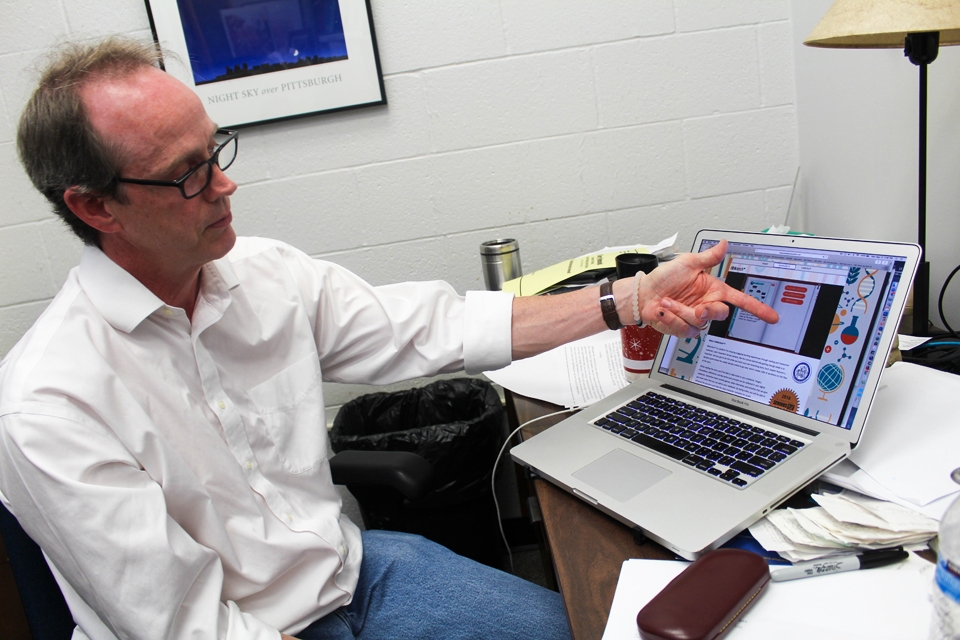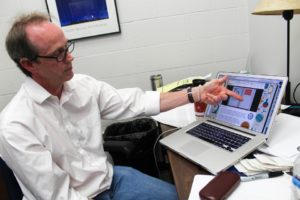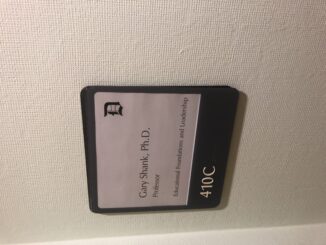

Duquesne biology professor John Pollock points to a section of his “Bibliotech” e-book app. The e-book is designed to help children and adults with health literacy.
Liza Zulick | Staff Writer
In the United States, 32 million adults are illiterate, and 21 percent of literate adults read below a fifth grade reading level, according to a study by the U.S. Department of Education. A Duquesne professor of biology plans to change this, with the help of a $250,000 grant.
John Pollock received the quarter-million dollar grant from The Hillman L. Family Foundation, a Pittsburgh-based nonprofit, to continue research for his “Bibliotech” project. “Bibliotech,” an e-book made for iPad, features an interactive story. Money from the grant will be used to help fund an upcoming second edition of the e-book.
“I’m concerned … because half of the adult population has a weak reading proficiency. They don’t get their information from reading, and it has a real impact on health care,” Pollock said. “Half of adults can’t read the info given to them by doctors, or simply do not want to read instructions on how to care for themselves.”
Pollock and his team have worked on numerous projects to increase health literacy in the Pittsburgh area since 2001, and with the help of the grant, they hope to continue their work.
Pollock’s first edition of “Bibliotech” allows users to learn why sleep is so important through the telling of a story. The story is about a 13-year-old girl who is interested in joining a coding club at school, which meets from 8:00 p.m. to midnight, but her mother says it is too late for her to be staying up. The girl decides to try to prove to her mother that staying up late is okay, and looks for the research necessary to sway her decision.
“Seeing how the children responded during the play-testing period of the latest app was the biggest accomplishment for [the] project,” said Stephanie Confer, a member of Pollock’s team. “We could tell that the app really engaged their curiosity and excitement for learning more.”
The second edition of the e-book will focus on sports related concussions, which have received a spotlight in recent years.
“It’s designed to engage kids in reading while they’re learning about some fundamental bits in science,” Pollock said.
The most recent grant awarded to Pollock will help continue the Bibliotech studies and create a new project called “Bibliotech Discoverers Transmedia,” which will be released sometime next year, Pollock said.
The e-book is designed to allow users to choose their reading level — for example, fourth grade, sixth grade or eighth grade based on vocabulary and sentence structure. With the help of iPad technology, the app will be able to help determine whether the level the user selected is truly the level reader of the user.
The e-book app is able to increase or decrease the level, so users can better understand the more they read through the book, according to Pollock.
“We know that when we give people something to read, most teachers give people the same amount of time to read. Some finish, others do not,” Pollock said.
Pollock believes that this adaptive book will be most useful in elementary and middle school classrooms. Rather than separate each child into a different group based on their reading comprehension, every student will now be able to read the same book, only at different levels. With the help of this feature, group work and discussions are possible since, each student now knows the same story.
Pollock and his team have also created many other projects to aid in educating children, including the Scientastic! TV series, which educates children on sleep, the Darwin Synthetic Interview App, which allows the user to ask “Darwin” questions just like an interview.
Brinley Kantorski, a biology and education major, was a part of the team that developed the e-book. Kantorski said she enjoyed working on the project.
“Being a member of Dr. Pollock’s team is one of the most challenging but rewarding professional experiences in my life … Dr. Pollock holds all members of his team to a high standard and the hard work and passion they put forth shows in the quality of his projects,” she said.
Pollock and his projects received a number of grants from different organizations to continue their research, including the National Institutes of Health, the U.S. Department of Education, The National Science Foundation, The John Templeton Foundation, The Pittsburgh Foundation and more.




